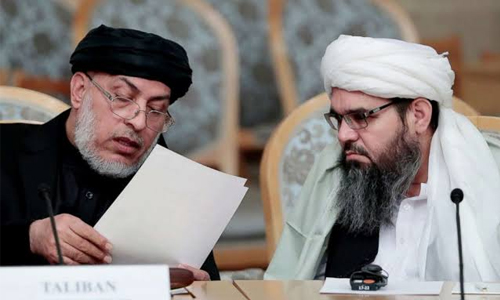the Taliban leadership did not adopt an outright policy towards peace talks. Omar’s successor Mullah Akhtar Mansour, dismissed talks about peace as “enemies’ propaganda” and emphasized that war would continue.
He had both his opponents and proponents. Mullah Mansour Dadullah, a battlefield commander, refused to pledge allegiance to Akhtar Mansour and accused him of being subdued to Pakistan. A skirmish broke out between Dadullah and Mansour but Dadullah was reportedly rescued by the ISIL group.
Dadullah claimed that he was back to Afghanistan after turning down to work with Pakistan’s ISI adding that the Taliban leaders were selected by the ISI. “They [ISI] proposed their recommendations for me which one of them was that I should kill people they want dead. They had other similar recommendations as well which were against Islam,” Dadullah alleged.
Moreover, another Taliban splinter group, which had elected Mullah Muhammad Rassoul as Mullah Omar’s successor, declared to hold negotiations with the Afghan government with precondition that foreign troops completely withdrew from Afghanistan.
On the other hand, Al-Qaeda’s leader Ayman al-Zawahiri pledged his group’s allegiance to Akhtar Mansour. He said, “As emir of Al-Qaeda, I pledge to you our allegiance, following the path of Sheikh (Osama) bin Laden and his martyred brothers in their allegiance to Mullah Omar.” Zawahiri called Abu Bakr al-Baghdadi’s caliphate illegitimate and prevented his men of swearing allegiance to him.
With Akhtar Mansour at the helm, the Taliban refused to hold talks with Kabul or Washington and continued their terrorist activities. They also cemented ties with Al-Qaeda, notably after the emergence of al-Baghdadi’s caliphate.
In 2016, Mansour was killed in a US drone strike in Balochistan for being a setback before peace talks and Mullah Haibatullah succeeded him.
Following his death, the Taliban leadership, however, signaled positively for peace talks. Sirajuddin Haqqani, who was elected as Taliban’s deputy supreme leader, said in an audio message that the Taliban were not against peace talks if they were held on the basis of Islamic Sharia.
In response to the question that the Taliban did not favor political dialogue, Haqqani was cited as saying, “Our Political Commission deals with the issue of negotiations. If we were opposed to talks, we would have never formed this commission. This was a consensus decision of the Taliban leadership.” He added that the Haqqani network was part of the Taliban and “Islamic Emirate is one”.
But the Taliban leadership had set preconditions for talks, which included re-opening their political office in Qatar, lifting of travel curbs on their leaders, release of their prisoners and end to “propaganda in Afghanistan”. A Taliban leader showed concern that holding talks without positive response to their preconditions would lead to a split.
However, the Taliban have been viewed with mistrust and there was no assurance if they could practice upon their words if their preconditions were met. The then President Hamid Karzai released a number of the Taliban prisoners despite the mistrust.
Perhaps the Taliban intended of “holding talks on the basis of Islamic Sharia” to have their preconditions met. And it would not either enrage the Taliban hardliners for negotiating with an administration they had fought against for a decade and half.
Finally, the Taliban continued their fight against Kabul and started talks with US representatives. The negotiations continued behind closed doors for nine rounds, which generated hope for Afghan officials and ordinary people. Notwithstanding the talks, the Taliban neither accepted to negotiate formally with the Afghan government nor reduce violence. This decreased the public hope for peace and Afghans again viewed the Taliban’s intention with doubt and mistrust.
After nine rounds of talks held between the Taliban and US representatives, an agreement had been drafted to be signed by their seniors. Nonetheless, US President Donald Trump called off the talks. Afghans celebrated Trump’s decision since the draft agreement would not put an end to the 18-year conflict. But it was disappointing for the Taliban leadership, who sent its delegations to some regional states to pursue resumption of peace talks.
US Special Representative for Afghanistan Reconciliation Zalmay Khalilzad has traveled to some countries, including Afghanistan and Pakistan, to seek peace talks resumption, it is not clear whether it will be started from the beginning or where it was left.
The Afghan government, which was sidelined, urges that it should be included in the talks. Regional states have to pressure the Taliban to negotiate with the Kabul government. If Kabul is out of the loop, the talks are unlikely to bear the desired result.
Home » Opinion » Taliban’s Complicated Attitude toward Peace Talks
Taliban’s Complicated Attitude toward Peace Talks
| Hujjatullah Zia

